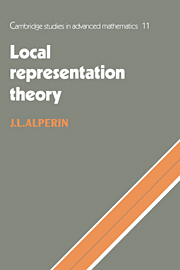 Local Representation Theory
Local Representation Theory III - Modules and subgroups
Published online by Cambridge University Press: 12 January 2010
Summary
Up to this point subgroups have played no substantial part but the deepest theorems bring in p-local subgroups in an essential way. In fact, the connections between kG-modules and modules for local subgroups are the most important tools. This chapter is devoted to introducing and developing these ideas.
Induced modules
The notion of a free module depended on a subspace of a module. However, a subspace is nothing more than a submodule for the identity subgroup and we shall generalize the idea of a free module by using modules for subgroups in place of subspaces. This easy extension of the idea of a free module is the basic means of relating kG-modules and modules for subgroups. After introducing this notion in a formal way, we shall give the usual description in terms of tensor products.
We now say that the kG-module U is relatively H-free, where H is a subgroup of G, if there is a kH-submodule X of U such that any kH-homomorphism of X to any kG-module V extends uniquely to a kG-homomorphism of U to V. Notice that, as we promised, if H = 1 then this notion is the idea of a free module. We also say that U is relatively H-free with respect to X and, with abuse of notation, with respect to any X′ a kH-module isomorphic to X. The first result is entirely analogous to the one on free modules and the proof can be instantly supplied by mimicking the early one.
- Type
- Chapter
- Information
- Local Representation TheoryModular Representations as an Introduction to the Local Representation Theory of Finite Groups, pp. 54 - 91Publisher: Cambridge University PressPrint publication year: 1986
